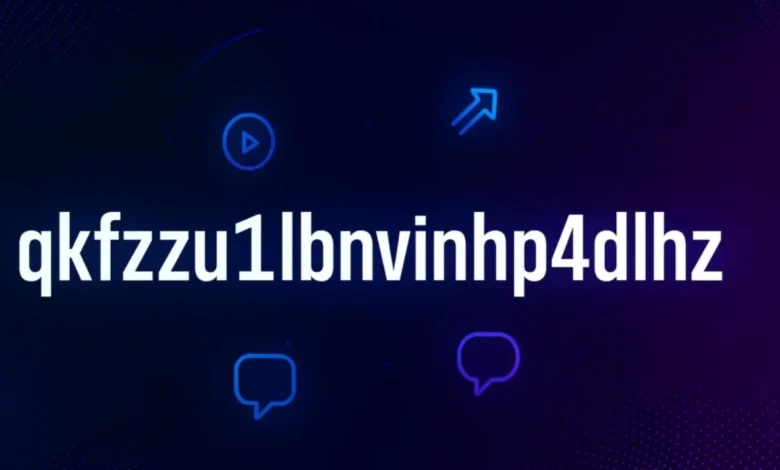What Is qkfzzu1lbnvinhp4dlhz

Table of Contents
Introduction
Every now and then, the internet throws us a puzzle that sparks curiosity across tech forums, SEO communities, and security circles. One such puzzle is the mysterious string of characters known as qkfzzu1lbnvinhp4dlhz. At first glance, it looks like gibberish—an odd mix of letters and numbers with no obvious meaning. Yet, as strange as it seems, this kind of alphanumeric code often plays important roles behind the scenes in modern digital systems.
So, what exactly is qkfzzu1lbnvinhp4dlhz? Is it just a random set of characters, a developer’s placeholder, or a deliberate identifier with real-world applications? Why are people suddenly searching for it, and what should you do if you encounter it on your website or in your system logs?
In this article, we’ll break down everything known so far: possible origins, technical uses, risks, benefits, and why the conversation around it matters. By the end, you’ll see that even “nonsense” strings like qkfzzu1lbnvinhp4dlhz can have meaningful implications for security, SEO, and the future of the web.
Understanding qkfzzu1lbnvinhp4dlhz
At its core, qkfzzu1lbnvinhp4dlhz is simply a unique alphanumeric string—a combination of lowercase letters and numbers that doesn’t correspond to any known word in English or other languages. Strings like this are often machine-generated, created to serve as unique identifiers, tokens, or placeholders.
Unlike human-readable labels (such as names, keywords, or file titles), machine-generated strings are designed to be unpredictable, anonymous, and secure. This makes them useful in areas like authentication, data tracking, and digital privacy.
Think of it like a digital fingerprint: meaningless to most people, but extremely important in specific contexts.
How Strings Like This Are Generated
To appreciate why qkfzzu1lbnvinhp4dlhz exists, it helps to understand how such strings are made. Common methods include:
- Cryptographic random generators – algorithms that produce unique, unpredictable codes.
- Hash functions – mathematical formulas that convert input data (like text or numbers) into fixed-length strings.
- Encoding systems – such as Base64, which translate binary data into readable character sets.
- Developer placeholders – sometimes programmers use random strings during testing, which later leak into live systems.
This explains why qkfzzu1lbnvinhp4dlhz might appear in URLs, metadata, or hidden parts of a website—it’s not meant to be meaningful to users, but it serves a function under the hood.
Key Applications of qkfzzu1lbnvinhp4dlhz
While its specific origin remains mysterious, strings like qkfzzu1lbnvinhp4dlhz have clear practical uses. Here are the main scenarios where they commonly appear:
1. Session and Authentication Tokens
Websites often need a way to track whether a visitor is logged in, but without exposing personal data. Unique strings act as session identifiers so the server knows you’re you—without showing your password or email.
2. Secure Links and Resource Sharing
Ever shared a private Google Drive file? Notice the long, random-looking code at the end of the link? That’s the same principle. These strings ensure that only people with the full link can access the content.
3. Analytics and Tracking
Marketers and developers sometimes embed random strings to differentiate campaigns or test versions of a site. It allows systems to tell visits apart without tying them directly to a person.
4. SEO Experiments
Some experts believe qkfzzu1lbnvinhp4dlhz is being used in search engine experiments. By introducing a completely unique string, they can measure how search engines react: Do they index it? How fast? Does it affect rankings?
5. Privacy and Anonymization
Since the string doesn’t reveal anything personal, it can be used in systems where user anonymity is essential. Unlike usernames or email addresses, it carries no sensitive meaning.
Why qkfzzu1lbnvinhp4dlhz Is Trending
So why is everyone suddenly talking about this odd sequence? A few reasons stand out:
- Curiosity Factor – People love internet mysteries. When something looks random but spreads widely, it grabs attention.
- SEO Testing – Content creators may be using it to test how search engines treat unusual, non-dictionary terms.
- Digital Security Awareness – As more people learn about tokens and identifiers, strings like this become symbols of the unseen web infrastructure.
- Viral Spread – Once blogs and social media pick it up, the conversation snowballs. What begins as a test becomes a trend.
Risks and Misconceptions
While strings like qkfzzu1lbnvinhp4dlhz are often harmless, confusion or poor implementation can create risks.
- Misunderstood as Malware
Non-technical users might assume it’s a virus or hack when they see it in system files. - Security Weaknesses
If such identifiers are logged publicly or exposed, attackers could exploit them for unauthorized access. - SEO Issues
Overusing meaningless codes in URLs could confuse search engines or hurt user trust. - Privacy Concerns
If tied to tracking without consent, identifiers may raise legal or ethical problems under privacy laws.
Best Practices for Handling Identifiers
For developers, webmasters, or businesses that encounter or generate such strings:
- Document Their Purpose – Ensure your team knows what they’re for.
- Keep Them Secure – Use HTTPS, set expiration times, and rotate tokens regularly.
- Minimize Exposure – Don’t display identifiers in public logs or unnecessary parts of a site.
- Respect Privacy – Avoid using them for hidden tracking without user consent.
- Monitor for Abuse – Audit usage to make sure they aren’t being hijacked or misused.
What We Still Don’t Know
Despite the theories, several questions about qkfzzu1lbnvinhp4dlhz remain unanswered:
- Was it first created as a deliberate SEO experiment, or just a random developer test?
- Is it linked to a specific product, company, or tool?
- Will search engines eventually recognize and ignore such random strings, or treat them as meaningful?
Until these mysteries are solved, qkfzzu1lbnvinhp4dlhz remains an example of how even a random code can capture global attention.
Read More: Anna’s Archive: The World’s Largest Open Shadow Library
Conclusion
The case of qkfzzu1lbnvinhp4dlhz reminds us how much of the internet runs on systems we rarely see. To the average user, it looks like a jumble of letters. But to developers, security experts, and SEO professionals, it represents the hidden machinery that powers authentication, privacy, data analysis, and web experiments.
Is it dangerous? No evidence suggests that. Is it important? Potentially yes—especially as the web continues to rely on unique identifiers for safety and efficiency.
For businesses and developers, the lesson is to treat these identifiers responsibly: document them, keep them secure, and ensure they enhance privacy rather than erode it. For curious users, the lesson is more philosophical: what looks meaningless often has meaning, just not one we see immediately.
In the end, qkfzzu1lbnvinhp4dlhz is more than a curiosity. It’s a symbol of how complex, hidden, and fascinating the digital world has become. By staying informed and cautious, we can embrace these tools while protecting both security and trust.
FAQs
1. What does qkfzzu1lbnvinhp4dlhz mean?
It has no meaning in human language. It’s most likely a randomly generated identifier used in digital systems for tracking, authentication, or experimentation.
2. Is qkfzzu1lbnvinhp4dlhz a virus?
No. There is no evidence that it’s malware. However, if you see it in your system unexpectedly, you should still investigate its source.
3. Why is qkfzzu1lbnvinhp4dlhz showing up in Google searches?
Because it’s being used in SEO experiments and technical articles, which has led search engines to index it.
4. Can I safely remove qkfzzu1lbnvinhp4dlhz from my website?
Yes, if you confirm it’s not required for functionality. Always back up your site before making changes.
5. Will identifiers like qkfzzu1lbnvinhp4dlhz become more common?
Yes. As online security and privacy rules strengthen, random identifiers are becoming standard tools for managing sessions, sharing resources, and protecting data.



